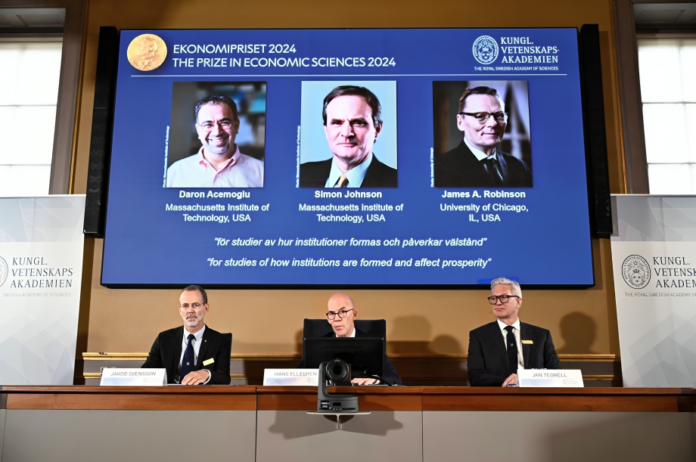The Nobel Economics Prize 2024 has been awarded to Daron Acemoglu, Simon Johnson, and James Robinson for their groundbreaking research on the formation and role of institutions in driving economic prosperity. This prestigious recognition, formally known as the Sveriges Riksbank Prize in Economic Sciences in Memory of Alfred Nobel, was announced by the Royal Swedish Academy of Sciences.
Their work has demonstrated how political and economic institutions significantly shape the wealth and progress of nations. The trio’s studies highlight how institutions can either foster economic growth and reduce income inequality or, conversely, lead to stagnation and poverty if they are weak or exploitative.
The Importance of Institutional Strength for Economic Growth
The Nobel Economics Prize 2024 shines a spotlight on research that underscores the pivotal role institutions play in shaping economic outcomes. Jakob Svensson, Chair of the Committee for the Prize in Economic Sciences, emphasized that “reducing the vast differences in income between countries is one of the greatest challenges of our time.” The laureates’ research shows how institutions—whether political, legal, or economic—are key in addressing this challenge and driving sustainable prosperity.
Daron Acemoglu, Simon Johnson, and Robinson’s work has been influential in both academic and policy-making circles, as it demonstrates that strong, inclusive institutions are fundamental for nations to flourish. Their insights help explain why some countries succeed economically while others remain trapped in cycles of poverty.
The announcement of the Nobel Economics Prize 2024 follows a series of Nobel Prize recognitions across other fields. U.S. scientists Victor Ambros and Gary Ruvkun won the Nobel Prize in Medicine for their work on gene regulation, and the Nobel Peace Prize was awarded to Japan’s Nihon Hidankyo, an organization advocating for the abolition of nuclear weapons.
The focus on impactful, socially relevant research is evident across this year’s Nobel announcements. The contributions of Daron Acemoglu, Johnson, and Robinson further align with this theme, as their research provides a roadmap for reducing income inequality and promoting prosperity through strong institutional frameworks.
The Nobel Economics Prize 2024 celebrates the transformative work of Daron Acemoglu, Simon Johnson, and James Robinson, whose research highlights the crucial role of institutions in economic development.
Their insights on how inclusive and robust institutions can drive economic prosperity, reduce income inequality, and foster long-term growth offer critical guidance for policymakers worldwide. As global economies continue to face challenges, the work of this year’s laureates provides vital solutions for ensuring a more equitable and prosperous future.
Nobel Economics Prize: A Brief History
The Nobel Economics Prize was established in 1968 by Sweden’s central bank, Sveriges Riksbank, and is not one of the original Nobel categories created in Alfred Nobel’s will in 1901. Despite being a later addition, it has become one of the most prestigious awards in the field of economic science. The prize, worth 11 million Swedish crowns (approximately $1.1 million), is the final Nobel award to be presented each year, concluding the annual Nobel Prize announcements.
The Nobel Economics Prize 2024 continues the tradition of recognizing economists whose contributions have shaped modern economic thought. Past laureates include influential figures such as Milton Friedman, known for his work on monetarism, John Nash, whose life was immortalized in the film “A Beautiful Mind,” and Ben Bernanke, former Chair of the U.S. Federal Reserve.
Previous Laureates and Their Contributions
Last year’s laureate, Harvard University professor Claudia Goldin, won the prize for her pioneering research on wage inequality and labor market disparities between men and women. Her work brought attention to the structural causes behind the gender wage gap, adding to the Nobel Economics Prize’s legacy of highlighting research with real-world impact.
This year’s laureates, Daron Acemoglu, Johnson, and Robinson, have contributed similarly by focusing on how institutions shape economic progress. Their research has shed light on the historical development of institutions and how they can either hinder or promote inclusive growth.


